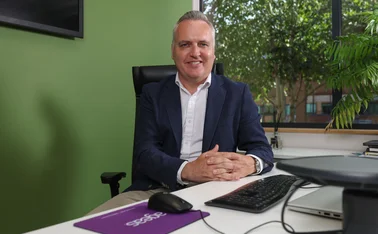
Analysis: SMEs: Emerging risks - Protecting the little guys

A changing risk landscape is creating new challenges for SMEs and those tasked with providing the sector with insurance. But SMEs need to evolve as newer risks such as cyber attacks and data protection – along with the raft of uncertainties around Brexit – create demand for additional cover
It is well documented that SMEs are vital to UK prosperity – there are some 5.6 million firms and they account for over 99% of total businesses, employing some 60% of workers in the private sector and having a combined annual turnover of £2trn, according to the Federation of Small Businesses. And despite the emergence of new risks, in many cases, fire, escape of water and theft protection may well still be essential elements.
Last year, a survey from insurer Allianz which questioned some 500 SME business leaders, found the top five risks were as follows: data loss/misuse/theft, the impact of Brexit, theft or malicious damage to business equipment or property, more advanced technology adopted by their competitors and a significant interruption to their business.
But, while this shows that many had awareness – and anxieties – about the General Data Protection Regulation and the increase in hacking incidents, the research also found that only half of respondents fully understood the risks which were facing their business. A further half also said they needed guidance from an expert on how to manage the risks. So, are brokers finding there is more call on their services?
New risks
Ashwin Mistry, executive chairman at Brokerbility and BHIB Insurance Brokers, comments: “Absolutely. The traditional package policy is often outdated and there is huge demand for advice from a broker who is professional and independent. Many firms realise that even if they don’t fully understand the risks, ignorance is no defence. GDPR, for example, has raised many questions on what data can be held and how businesses communicate with their customers.
“As for Brexit, the ramifications are immense and firms want advice on preparation. There are a raft of issues, from currency issues, health cover, driving in Europe and the impact on supply chains to name just a few. We can’t always promise to know exactly what is going on, but part of our role is to make sure we have the most up to date knowledge and to leverage our contacts to help clients.”
He adds that there are also internal concerns that affect SMEs, such as the many aspects of employment law and the pressures on businesses to remain compliant with all the rules surrounding matters like the minimum wage, working hours and avoiding discrimination.
Mistry has noticed more SME owners stepping up to the plate. “They want a broker who is going to be a business adviser and not just talk to them about insurance. But they also need to spend time trying to see what could be affecting them in the future. So, small businesses can be caught up when there is a major collapse such as with Carillion and indeed, the torrid times affecting the retail sector. There is more need to self learn now.”
He points out that even the recent drone incidents that closed Gatwick and Heathrow airports resulted in potential SME disruption. “Something can happen completely unexpectedly that can prevent trading and they can occur out of the blue. Insurers that focus price and non-advised sales are not what most SMEs want – for example, I was dealing with a client recently who runs childcare nurseries. They face many risks but the biggest one at present for them is their data and how it can be protected.”
Mistry says contacts at the British Insurance Brokers’ Association and its parliamentary connections have been useful and David Perry, managing director at FSB Insurance Service, says working as the insurance provider of the trade association means he is close to what is happening in government and the wider business community.
“The amount of businesses getting in touch for advice is unprecedented. Of course, when it comes to Brexit, there can be no definitive answers but we can certainly help firms with preparation and try to keep them as up to date as possible.”
He adds that brokers can also help develop timely products. “Talking to colleagues within the FSB, it’s clear that access to funding is high on the agenda and late payments are a big problem. We’re getting a lot more of our customers saying they want credit insurance, but a perennial issue with this is that many find the premiums too high. So, we’ll be launching a per invoice product that promises to be far more affordable. We’re also developing cover for those who agree to act as guarantors, which should make access to loans easier, and we’re also working with Pool Re on how understanding of terrorism cover for SMEs can be improved.”
He explains that FSB Insurance Service and Pool Re will develop a red, amber and green ‘traffic light’ tool that will help businesses decide if their risk of being affected by terrorism would necessitate buying cover.
Arguably, since the Westminster and Manchester Arena attacks, terrorism risks will have faded somewhat as the Brexit whirlwind continues to encompass the UK.
However, according to Perry: “Terrorism risks have not gone away and we welcome the fact that Pool Re now covers business interruption where there is no material damage.”
He points out that the fact a firm is small should not preclude the availability of relevant cover. “It is a misconception to see SME products as standardised. It should depend on the broker advising the client on what will be suitable for their needs and if they only choose to buy a single package, then this needs to be as comprehensive as possible.”
Perry points out that FSB Insurance Service’s core offering includes some cyber cover included as standard. “FSB Cyber Protection provides up to £10,000 for third party claims and up to £5,000 for first party claims and also unlimited use of the FSB data and cyber advice line. If the client wants higher limits, then we can arrange this.”
Cyber demand
Meanwhile, Bryan Banbury, managing director of broker Russell Scanlan, says many more of his SME clients want advice on and to buy cyber cover. “In recent years we’ve really seen insurers up their game. There are more claims and overall, it is pleasing to note that they are responding well and broadly, these policies are affordable.”
With many more providers in the cyber space, Banbury says the market is functioning well. “Providers we use have agreed they will meet the cost of fines providing the company was not reckless and they are also supplying good levels of practical assistance. I know of a number of clients who have used the helplines and the cover has proved its worth.”
He adds products such as legal expenses where there are helplines included can also often be valuable in sorting out problems before they become more serious. “There are changing employment patterns and employers need advice on all kinds of issues, such as staff working from home and health and safety issues. There is also a lot of readily accessible risk management information, which brokers can advise on.”
Banbury adds: “The ability to be able to pick up the phone when there is so much uncertainty about risk is something that many brokers’ clients really appreciate. We also have two very experienced claims specialists and being able to speak to them as soon as something happens for advice and without having to approach an insurer can be extremely useful.”
A further issue is growing awareness of sexism in the workplace and broker Marsh recently pointed out this may lead to employment practices liability insurance being increasingly popular. It pointed out since #MeToo went viral in October 2017, the severity of sexual harassment claims has increased. Plaintiffs’ lawyers have been emboldened to seek larger damages given the often high-profile nature of accusations and defendants’ desire for quick and quiet claims resolutions.
While brokers clearly are proving their worth with their SME clients, can the same be said for insurers? Being larger organisations, they arguably have less flexibility to respond to changing risks.
However, Gareth Hemming, director of SME at Aviva, feels there is a move away from commoditised cover. “There’s a lot of room to innovate and to enable customers to make more informed choices. We want to make business insurance less complicated and offer solutions that can be selected from a roadmap according to particular risk needs. In terms of SME cover overall, insurers are still asking too many questions. But there is a lot of publicly available data that we could use to make it quicker and easier to obtain the right cover.”
Although there has been a rise in SME cover being marketed direct, Hemming says brokers continue to hold their own. “I keep hearing that customers appreciate their broker’s advice and expertise – they bring risk to life.”
Insurer support
Jon Walker, executive managing director, commercial intermediary, for Axa Insurance, adds: “SMEs are exposed to ever changing risks, whether it’s stricter regulations, advanced technologies, new working arrangements or the changing needs of customers and employees. Being faced with multiple challenges can be daunting and it’s essential their insurance needs are fully understood and translated into the right products, with appropriate covers. For business interruption, for instance, it’s crucial sums insured are accurately calculated and the right level of indemnity period selected.
“Of course, when you own or manage a small business, you can’t always keep up with all of the changes, so the best advice is to partner with a broker that will take time to understand each individual business and explore their needs. At Axa, we also have an in-house team of risk management experts who will share their knowledge, including how to prevent claims, with brokers and businesses to minimise and manage risks effectively.”
Allianz’s digital trading manager, Julie Tongue, says her company is closely tuned in to its brokers in terms of product development and disseminating knowledge about newer risks. “It works both ways – we are out in the market talking to brokers and also listening to their feedback including via live chat on our ‘Quotes Me’ platform and we also provide them with regular thought leadership papers on hot topics. Brokers are also connecting directly with customers and so this helps us discover what they want. We also provide them with risk management guidance and they can take that direct to their clients, perhaps in helping them work on areas like the risk register.”
Meanwhile, Ben Maidment, class underwriter, cyber, privacy and technology at Brit Insurance, says working in tandem with brokers and providing training classes and courses on risks such as cyber is proving effective. Brit offers Data Safe, a suite of risk management tools to help manage exposures, including compliance advice, a breach reporting hotline and a triage service. He adds: “We will see a growing number of smaller companies taking out cyber insurance because there is regulatory focus on ‘silent’ cyber exposures in traditional property and liability policies. There is concern that some claims won’t be paid because of the lack of clarity – standalone polices help firms know where they are and so are a better option for the customer.”
Another choice for customers thinking about cyber is Cyber Decider, a comparison site for policies. CEO Neil Hare-Brown, who also runs response service Storm Guidance, comments: “We are handling more incidents than ever before and SMEs, in particular, often have a lack of IT staff. It surprises many that even if they think their data is lost – say as a result of ransomware – that there is a lot that can be done to restore it if they have access to an expert response team. Even so, less than 10% of SMEs have cyber cover, even though GDPR continues to ramp up the pressure.”
He adds that further risks are on the horizon as smart buildings and the internet of things become mainstream and hackers gain access to key targets. “Cyber cover will work better when there is more assessment prior to taking it out and if there is too much emphasis on automated sales, there will be a rise in claims and premiums will increase. We need to see more focus on who is being insured and better wordings so that brokers can advise on appropriate insurance.”
The fact there is recognition of these new risks and that brokers and insurers are focused increasingly on the end customer is positive. There are many uncertainties out there and SMEs do not want insurance to be inaccessible in terms of either cost or complexity. If businesses choose to take guidance, however, the determination of brokers to serve smaller clients’ needs does well in terms of securing cover that will work into the future.
Further reading
Only users who have a paid subscription or are part of a corporate subscription are able to print or copy content.
To access these options, along with all other subscription benefits, please contact info@postonline.co.uk or view our subscription options here: http://subscriptions.postonline.co.uk/subscribe
You are currently unable to print this content. Please contact info@postonline.co.uk to find out more.
You are currently unable to copy this content. Please contact info@postonline.co.uk to find out more.
Copyright Infopro Digital Limited. All rights reserved.
As outlined in our terms and conditions, https://www.infopro-digital.com/terms-and-conditions/subscriptions/ (point 2.4), printing is limited to a single copy.
If you would like to purchase additional rights please email info@postonline.co.uk
Copyright Infopro Digital Limited. All rights reserved.
You may share this content using our article tools. As outlined in our terms and conditions, https://www.infopro-digital.com/terms-and-conditions/subscriptions/ (clause 2.4), an Authorised User may only make one copy of the materials for their own personal use. You must also comply with the restrictions in clause 2.5.
If you would like to purchase additional rights please email info@postonline.co.uk









